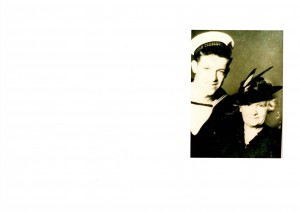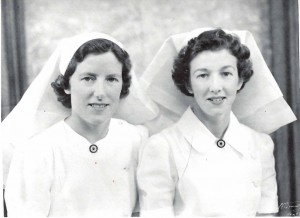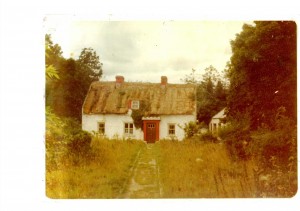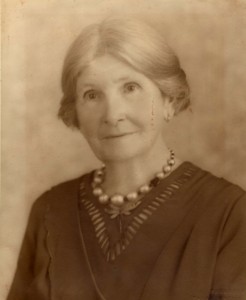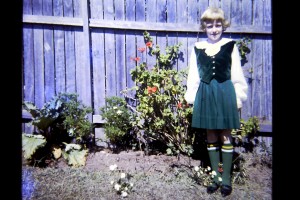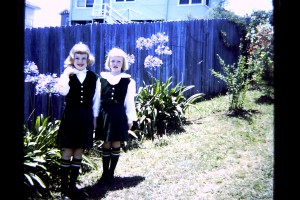The Local Parish Dance: Searching from the Edge. Jules Mc Cue
“Caelum non animum mutant qui trans mare current” [“They change their sky but not their soul who cross the ocean.”[1]
Today is the 20th October 2007: an otherwise unremarkable day but not for those of my family. Twenty years ago our mother Inez Patricia de Valera Connolly[born 1921] and her eight children [Carmel, Julianne, Christine, Mark, Paul, Mary Ellen, Gerard and Anne], buried our father Keven McCue on what would have been his sixty-sixth birthday. Unlike today at Bruny Island, an island off the island of Tasmania, an island off the island of Australia, where the sun shines and the cold, clean water beckons me, that was a dark, grey, wet day. This was a good thing, as Keven loved the rain and was often seen by my mother and me, playing golf on the Liverpool course in a downpour, as we hurtled past in the train. Keven, a man before his time in some ways, understood the need for water.
. 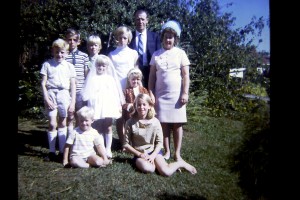 Keven, Inez and their children: [left to right] Mark, Christine, Carmel [back row], Paul, Mary Ellen, Anne [middle row], Gerard, Julianne [seated]. 1969
Keven, Inez and their children: [left to right] Mark, Christine, Carmel [back row], Paul, Mary Ellen, Anne [middle row], Gerard, Julianne [seated]. 1969
However, the 20th October twenty years ago was a remarkable day for some. Having been besieged by grief and the horror of our funny father’s diabolical and premature death, we were unaware that the stock market had also had a dark and dreary day. When speaking on the phone to my brother Gerard last evening, he said he hadn’t realised how much influence Keven had really had. He died at Campbelltown Hospital on the 17th October 1987, late into the evening. We suspect that he had just three days to get over to New York and do the deed, for he was disgusted by greed and man’s inhumanity to man, so much of which is driven by corporate culture. He was, except for a few truly spiritual persons I have encountered, the least materialistic of any I had known. Our Mother who art in Heaven ten years since, used to say that if it were up to him, we would be sitting on a fruit box and sleeping on a mattress on the floor. He was certainly eccentric and anachronistic. He detested the television which he called the “idiot box”, and foretold the tragic story of the demise of strongly bonded family and social life. He reminisced about sitting around the kitchen table in talk and surrounding the piano in harmony.
Keven and Emily McCue c. 1942
From that time on there would be no more boogie woogie, Old Man River, Goin’ Home, Deep River and Short’nin Bread, on the rosewood piano that came to us as one of the great blessings from our maternal grandmother, Mary Connolly née Joyce. At the time of Keven’s death, I lived at Cawdor near Camden in New South Wales and was teaching Visual Arts and French at a local high school. Inez, our mother, perhaps through her sorrow, became seriously ill with a form of leukemia and battled on for another eight years, just as she had every day of her life out at Campbelltown, rearing eight offspring. Up until then I was a prolific painter; I had never ceased to create but now I had lost my muses. I was by this time, living in a small Wesleyan Chapel and a Sunday school hall at Picton in the foothills of the Southern Highlands of NSW, where I had hoped to set up an art school. This was never meant to be and when I realised that Picton was no longer the place for me, I put the property on the market and after seven torturous years, I finally sold it and flew to Tasmania, where I believed I could at least live comfortably in a cool climate, surrounded by water, within a society of people who probably would not be racing around to acquire huge amounts of money and material possessions. Perhaps they would be possessed by the landscape.
Joyce and Inez Connolly
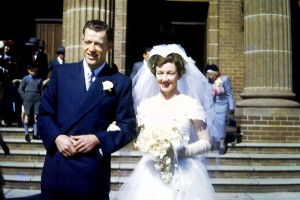 Inez Connolly and Keven McCue 1954
Inez Connolly and Keven McCue 1954
I had always been restless about living in Australia that seemed so far from what? As soon as I was old enough I took leave from art college and returned to Ireland in 1977. It was an imperative for me at the age of twenty to tread upon the land of my ancestral heritage; this was a sort of inner searching for truth that continues until this day. I may have been born at St Margaret’s, Darlinghurst in Sydney where my mother had once been a midwife, but I am of ‘Irish Blood’. Was I fortunate to know who I was and where I came from? Does this knowledge when one is in exile, only create pain and longing or does it give one a sense of identity? I believe now that like anything, this awareness has both sides of the coin to offer. If you don’t know where you came from then you don’t long for it and wonder what if? On the other hand, if you don’t know where you came from in a young country that lacks a true cultural and spiritual anchor, then you are like a body without a soul or a head: whichever is relevant. As expected, I felt very much at home in Ireland and saw there, reflected in the faces, many people I had always known. Most Irish people at that time were struggling to survive and of course, “the troubles” in the north were at their zenith. Having grown up on a bounty of fresh red meat and vegetables, I was shocked to see the little piece of not-so-red meat in the butcher’s shop in Limerick. It was unnatural and disconnected though, to merely drop into place so far away, out of the sky in an Aer Lingus jet. I immediately bought the recently published, A Terrible Beauty by Leon Uris in order to orientate myself in the Ireland of 1977. Back in Australia, we had lost touch with the reality of the situation and had never been taught the real history of the terror. From here on, I had to deconstruct, dig up or unravel, the untold history and search for a truth that had been buried by the distance of our exile.
I went to visit my only known relatives [at the time] in Clare Galway, taking the road to Tuam. My cousin Mary Kathleen McDonagh née Joyce almost fainted when she saw me and two friends at the gate of the little mixed farm. Mary Kate brandished a work coat or dust jacket, as was the custom, and a cigarette in her mouth which she in her state of shock, ashed in her pocket. I believe she may never have seen the likes of three, big, Aussie girls clad in blue denim jeans, the uniform of pop culture. The original white-washed farmhouse was still there in a moribund state. The windows and the red door were small in scale. It was impossible to get a thatcher to repair the roof, so it was later pulled down. I believe there were paintings all over the walls. I wish to this day that I had sighted them: fancy having great, great uncles of the Joyce family who painted pictures. I have now discovered another link to my chosen art form, as I had always believed that there wasn’t a great deal of visual art from the Irish that is noteworthy, other than the talismans of turning circles painstakingly engraved into rock from Druidic times. I believed, at the time, that music and writing had always been the creative and poetic media through which the Irish expressed their joys and sorrows. Notably, the exception is the Book of Kells; those illuminations of the Christian scriptures that contain a most deft embellishment and dynamic, symbolic imagery.
Joyce Family home in Clare Galway 1977
So, today, it is in exile on foreign soil that I write; I have found another island with a soft sky, a cold wind, hulls afloat and sails that flutter in the roaring forties. It isn’t Eire but it almost seems like home: at least for the moment. In Hugo McCann’s paper on the Irish poet Seamus Heaney, Governing the Tongue, he ponders over the exile of language as metaphor for colonization in one’s homeland, especially for the writer:
The Irish are speakers of a language which is not theirs. Its use comes to them through the faults, defaults and accidents of history. . . Heaney like Joyce and a long list of other writers in English, writes from a colonial subject’s perspective and Heaney returns to this subject matter a number of times as, of course, did the logomaniac Joyce with his immense capacity to rummage in the languages of Europe and forge new forms in which to explore everyone’s experience. [2]
So the Irish use English from the outside as onlookers, not from within the culture from which it comes. How does this affect the way we communicate here in the colony? As I sit here writing I look out over the D’Entrecasteaux Channel, a capacious valley of water between the mainland and Bruny Island. Every time I visit my shack which is also a studio, I am reminded of the rapacious past of the colonial invaders and lament for Trugannini, who swam from here to there and dived for shell fish with her aboriginal sisters, in what would seem to have been an antipodean paradise.
He looks up at the colonial brickwork of the old pub. Now painted Irish green, and remembers the story Harry had told him about William Lane – King Billy Lane- the so-called last of the full-blooded Tasmanian Aborigines, a whaling man who worked the southern seas upon the Runnymede, who had died on the top storey of the pub in 1869. When his body had been taken to the hospital, a local surgeon by the name of Crowther, snuck in and cut Lane’s neck up its nape and pulled Lane’s skull out and placed a white pauper’s skull in its place, then crudely stitched the mess back together. Later in the same evening another doctor, Stokell, turned up with the same aim, only to find to his dismay that he had been beaten, so he contented himself with chopping off and stealing Lane’s feet and hands for the Royal Society. The skull brought the surgeon scientific credibility, for there was much interest in Europe in the phrenology of supposed inferior and degenerate peoples. [3]
Richard Flanagan a native Tasmanian writer of ‘Irish Blood’ has thrashed out this story, writing as a post-colonial [is it?] subject in a faraway land. He writes through a stream of consciousness, extracting the stories that were lurking in the bush and the water of the rivers and oceans, as he really did fight for his life in one of the wild rivers of the Tasmanian wilderness. Like all great art, truth lies embedded in its beauty and throughout his first great novel, Death of a River Guide, Flanagan exposes, through rich and clever literature, the truth that is evident in the above exert. He meshes realism with imagination and expresses the ghastly story of oppression and murder with ferocity and explicit, historic detail, whilst retaining a poetic expression of the highest order. The grim and dreadful story of the most isolated penal colony of Sarah Island on the Tasmanian west coast is related to us in his third novel, Gould’s Book of Fish with hyperbolic, colonial drama, that through the poetry of magic realism is conveyed with a strong whiff of the blood and sweat of oppressive, British rule, more palpable than is the reality from which we still hide. Flanagan, himself, is halfway between home and exile. This extract from Gould’s Book of Fish is from the main protagonist’s narration, William Buelow Gould, the most unfortunate man on earth. From an unfortunate beginning he hurtles to the depths of a Van Diemonian penal colony: the worst of the worst. He becomes the illustrator of fish for the mad commandant: [William Buelow Gould is the narrator from the chapter The Porcupine Fish]
Our second meeting took place immediately after my entirely unexpected release, when I was trooped straight from my cell to Mr Lempriere’s quarters, a small, somewhat ramshackle whitewashed earth cottage. On the way we passed a flogging taking place in the muster yard. The flagellator was pausing between each stroke of the cat, running the tails between his fingers to squeeze out the excess blood . . . [4]
As a man of ‘Irish Blood’ and one who derives from a family of kitchen-table-tale-telling, he is not afraid to speak out against avaricious mates of mendacious governance, here in the island state. The struggle to survive goes on here, as does the abuse of power in the form of blatant corruption: is that the inheritance of a penal colony?
I could not have known how such madness, this job of painting fish to further another man’s reputation in another country, would come to overwhelm my life to such an extent that it would become my life- that I would, as I am now, be seeking to tell a story of fish using fish to tell it in every which way, even down to the sharkbone quill & the very sepia ink with which I write these words, made from a cuttlefish that squirted me only a few hours ago. [5]
McCann says, “that for Heaney, politics is related to the personal” and that “The sense of anguish engendered by Heaney’s reflections on the world, his place and purpose in it, is a recurring one.”[6] Flanagan’s need to find truth also becomes his medium as the recurring theme of digging up the long line of injustices inflicted on all who stood in the way of the ever- expanding- empire, the essence of which, is found in each of his four, fine novels up to this day. Medium and message are inextricably linked. He like Heaney, poet-archaeologist digs up the dirt; McCann analogizes Heaney’s finest work as does the poet himself with the act of digging, as he comes from a long line of peat-bog-diggers who made it an art. Unlike his father, the artful digger in the poem Digging, Heaney uses the pen to dig to the depths of his soul and all life embedded in the landscape, where he searches for the truth.
Between my finger and my thumb
The squat pen rests; snug as a gun.
Under my window, a clean rasping sound
When the spade sinks into gravelly ground:
My father, digging. I look down. . . .
By God, the old man could handle a spade.
Just like his old man. [7]
Having read McCann’s paper included in a publication of papers delivered at The Eighth Irish-Australian Conference, Hobart July 1995, it occurred to me that there was a longitudinal link not only through the shovel but the pen and this great gift of words is flourishing throughout the world in the form of the Irish Diaspora. Even Heaney it seems, felt ontologically exiled in the land of his birth:
As his writing has developed and ranged more widely, the rural and nature poet has come to use the landscape in his life as landscapes of moral action and reflection – ‘un paysage moralisé’. The landscape of Derry, [Mossbawn], of Wicklow, [Glanmore], become the rich source of his figurative life; they become redolent with meanings which Heaney uses to offer his nuanced readings of himself, the world and interchange between the two. His travels, his journeys, his relocations become symbols of a fluctuating exile. [8]
Richard Flanagan born in Tasmania of ‘Irish Blood’ and indeed some convict blood has also been threatened to exile and told to “govern his tongue”. However, it seems, that he not only has a truly great gift, but he will not be stood over, he will not back down. He will not see the last old growth forest burn. He continues to write of the truth about Tasmania and continues to exploit his tremendous talent and the courage that he has running through his diasporic veins. As a young man he was awarded a Rhodes Scholarship and did his reading at Oxford. I believe he read Joyce, as did Heaney. As did Heaney, Flanagan allowed Joyce’s ‘shade’ into his work. He too, uses the history and the landscape of his locale to reflect the morality of the situations that are close to him and those of the world of fear, terror and divisiveness. Unlike Heaney, who knew his Gaelic tongue, Flanagan has lost his Gaelic, but his masterful discipline of the English tongue is a deconstruction of a language that has one view from the arrogantry to a language that is deflected through a reflected view, as a post-colonial subject. Joyce told Heaney through Heaney’s reflexivity, wherein he speaks to Joyce’s “shade” [a person’s soul after death], that “The English language belongs to us”. [9]
Heaney was living in Ireland in an exile due to his use of the ‘other’ language to express views through poetry of his own. Like Flanagan, it is the development of something new from something old. The baton continues to be passed down through generations and now across the lands into new nations. The bold and passionate Irish spirit will never die.
They intuited that the Celts are not a racial group but one bound together by language. To conquer, to dominate and exploit, it was essential to strike hard at that cultural core and destroy or enfeeble the mighty languages of the Celts. The war for Britain was as much a war of words as it was of blood and steel. [10]
So it was that mighty language was at the heart of the Celtic people and so it is that these people must have a gift for beauty and truth, rising from somewhere deep within the psyche, as it continues to have a flowering in the language they were forced to speak. In the cultural flourishing of the diaspora, we come to realize that these people didn’t lose their hearts and souls when they lost their language. Sure, they lost rich meanings that were intertwined with the landscape, the sea and rural life, but they continue to express the riches from within and without, through their languages of exile. The spirit survives beyond linguistics. The Celtic languages were laced with rhyme and rhythm. Before they could write, the Celts developed highly sophisticated versification that they learned by heart to aid their memory. Their use of symbol, metaphor and humor was impressive to many a foreign ruler and enemy. So they can be said ‘to have a way with words’. Much of their cultural life, of course, was influenced by the sea, by which they were surrounded. Is that why I must be near the sea, on the sea and in the sea? That is what I can hear now and all through the night. Is there such a thing as inherited memory? For those of you who are able, the Gaelic version by an anonymous poet has visible patterns, but these become sounds only, in the English version. The sea is all-important:
An ataireachd ard,
Cluinn fuaim na h-ataireachd ard,
Tha torunn a’ chuain,
Mar a chualas leums’ e nam phaisd,
Gun mhuthadh, gun truas,
A’ sluaisrwadh ganneimh na tragh’d,
An ataireachd bhuan
Cluinn fuaim na h’ataireachd ard. [11]
Or for we of the tongue of exile:
The high surge of the sea,
Listen to the high surge of the sea,
It is the sound of the ocean,
As I heard it when I was a child,
Without cease, without pity,
It washes back and forth on the sands of the beach.
The eternal surge of the sea,
Listen to the high surge of the sea.
In the year 2000, at the dawning of the new millennium I was fortunate to return to Ireland. This time I was determined to travel by sea wherever I could. I had also returned to France to visit the Celtic coast of Bretagne and travelled north to Normandie. I believe Joyce is a Norman name. I took a ferry from Ouistreham to Southern England making my voyage along the wake of the great conqueror, Guillaume in 1066. After a visit with friends in Herefordshire I sailed from Fishguard in Northern Wales to Rosslare in Wexford. Perhaps my Norman ancestors travelled from England through Wales and Ireland on the same path. I gained a more tangible sense of place and ambient, cultural shift by sailing to my ancestral home. I wept at my first sighting of the land: I know not why. A swift splash of silver – a Tasmanian built catamaran flew past us. I picked up my rental car and commenced my journey to all of the places that my great grandparents had fled from during the famine years.
My first port of call was Whitegate on Cobh Harbour where my father’s mother’s people had lived in a pretty, white house looking over the bay. The Coadys and Helens were school teachers, pawn brokers, shoemakers and farmers. Next I traveled up through Limerick and Kerry returning to Galway after twenty-three years. Ireland was a different place. The tractor had replaced the horse on the country roads. The main roads were full of cars and they were all shiny and new. I stayed in Galway City for the first evening and rang Mary Kate of my Joyce ancestry at Clare Galway. Her daughter-in-law Brida answered the phone and they welcomed me for an overnight visit the next day. I could definitely live in Galway. Mary Kate was now eighty-two and as smart as ever. She had just won a box of books: something to do with a quiz on the radio. Paddy her eldest son was the local doctor. Gerry who had maintained the farm, was subsidizing his income with other work in the city. The one daughter Carmel, a nurse, was now living in New Zealand. When she left with her fiancée, work was scarce, unlike today where they need all the workers they can get. All of them seemed so relaxed and happy unlike our people in Australia. They had chosen suitable partners and had beautiful, contented children. They were living in their own land of culture and religion. They were still firmly faithful to the Catholic Church. They had no question of identity and never had. I envied them.
On the subject of finding one’s soulmate, perhaps Kathleen Behan is the sagacious old woman, when she tells of her becoming married for a second time after her first husband Jack Furlong had died. Although, the circumstances for women were completely different:
I was four years a widow. . . As a widow I do whatever I liked – but then I met Stephen Behan. . . I loved him the very first time I saw him. Men don’t marry women, you know, it’s the women that marry the men – and we were married in no time. [12]
My mother had never thought to pass on this wisdom to me, although I had a feeling that she had married my father who was probably like Stephen Behan who Kathleen believed would have drifted on happily without a wife, keeping himself busy with ‘the cause’. Like my own father, he didn’t take much notice of his children when they were little, too busy working long hours and the contemplating of ideologies. So, I asked my Irish cousins in Galway how they had come upon their partners. Brida and Gerry, Mary-Kate had all met “at the local parish dance”. By the time I was the age at which they had married, I had left my home-town, begun studying at the art school in Sydney, where my head was filled with new ideas and when I was twenty, I was in Ireland and Europe searching for the truth and history of my background. Until this age I had remained a practising Catholic, but I was slowly unwinding this faith. The travel and the historical investigation opened up my mind and I discovered that my knowledge was scant and had been controlled by various authorities. I attended St John the Evangelist Primary School and St Patrick’s College at Campbelltown in New South Wales. This was no different to any other Catholic education and don’t get me wrong; I am extremely grateful for the brilliant education I received, especially at the high school level. By the time I had completed the NSW Higher School Certificate I was a competent writer in English and French, could play up to fifth grade piano, paint in oils and acrylics, write about Renaissance architecture and Impressionist painting, sing in the choir, swim a fast lap of a fifty metre pool and play lots sport. In short, I had received a well-rounded education that serves to enrich my life.
I then travelled through the waterlogged wonderland of Connemara country to Clare, Mayo and Sligo until I reached Donegal. Mary Kate said that Connemara would get me back to painting. When I told her that there were many Irish men in and around Sydney working in excavation, she replied in saying “that our boys, they just love digging up the dirt”. I stayed the next night at the small but important fishing village of Killybegs. Yes, I could live anywhere around the West Coast. I drove on up the Donegal coast until Bloody Foreland was in my sights. I had heard some wonderful but fictive stories about how this wind-swept outpost got its name. I could see ever so faintly in the distance, Tory Island from where my paternal, great grandfather hailed. His parents were McHugh and Gallagher. There are some relatives in Letterkenny but I didn’t have the time to fit the fragments of this archaeology together: next time.
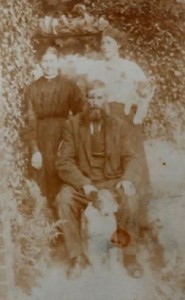 Great Grandparents, Owen and Bridget [nee McDonnell] Connolly and daughter Maggie?
Great Grandparents, Owen and Bridget [nee McDonnell] Connolly and daughter Maggie?
Great Grandmother: Ellen Joyce nee Crane [Crean] [currency lass]
It was time to head off and return south to Monaghan. This meant that I was to go through Derry from where my great grandmother’s mother had hailed. Mary Cassidy was her name if I remember. My great, grandmother, Ellen Crane’s husband Stephen Joyce from Galway, died in his early forties after planting pine trees around the church at Blackheath in the Blue Mountains and left her with five children. As there was no support in those days, she was forced to move to Balmain, where she took on washing and ironing. She lived right at the bottom of Thames Street and my mother Inez said that she read the Labour Daily every day. She brought up a few wild boys I believe. Anyway, I didn’t linger in Derry or the next towns, as all the flags were up. I sensed a hostile atmosphere and realised I’d been naïve to have gone there, as it was the day before marching day, 2000.
Eventually, I arrived in Monaghan from where my mother’s paternal, great grandfather had come. Owen Connolly was his name: he set up a couple of tanneries near Wallerawang and Piper’s Flat up near Lithgow in New South Wales. He had married Bridget Mc Donnell from Castleblaney. At the time of my grandfather’s birth in Sofala, they were a maid and currier, respectively. Monaghan was an idyllic country town in a thriving, rural setting in 2000. I could live there, easily. Sofala was a new and bustling town out west in the heart of the nineteenth century gold rush. Time was running out and I had to return the hire car that I had picked up in Rosslare, to Dublin. From Dublin, which I didn’t see enough of, I went out to Delvin in County Westmeath to visit my father’s relatives, Jane Reilly and her two brothers, Christie and Wattie Colgin. They still grow much of their food and especially potatoes. I had a lovely meal and visited the farm where my great grandmother Annie Casserly had lived, before she came to Australia in the latter half of the nineteenth century, along with many others exiled from their home. Eventually, she meets James Mc Hugh as her second husband in Sydney. Her first husband, Michael McCue had died on board ship as they and James McHugh had previously lived in New York, had now been forced to migrate to New South Wales. James changed the spelling of his name to make it easier for the sake of the children, of which they had many. Some years ago, I met up with a Kate McCue who was also a teacher in New South Wales. She was descended from the first McCue. One of James’ sons, Patrick McCue, was a star player in the first Wallabies team and one a gold medal in 1908 at the Olympic Games in London. [Against England!] Paddy collected his father James from the inner Sydney mental hospital, after a twenty-year incarceration. How did this dislocated man from Donegal who spoke Gaelic on his death-bed end up in such a place? That is another story, as I believe the Irish were over-represented in these institutions.
Unfortunately, my time in Ireland ended too soon and I pledged to myself to return as soon as possible. I would have loved to have spent some time with Christie and Wattie who had one night every week at their local. Wattie has passed away since then as he missed his wife too much. Christie was a contented single man. Jane their sister, also admitted that she had met her husband “at the local parish dance”. There were many of my great uncles and aunties who didn’t marry. Only four out of the eight in my family have married and had children.
Home to Australia again, but it doesn’t feel like home. This island is too vast. Eventually, at the end of 2003, self-appointed exile; off to Tasmania, taking the same journey as did Joseph John Therry, the priest from Cobh, through Yass to Melbourne on Port Phillip Bay, embarking for Hobart and travelling through the rusticated, stone-built towns of the Midlands of the “Apple Isle”. I expect that Therry sailed all the way to Hobart. I had departed from the same territory, Picton near Campbelltown in New South Wales.
After a short stay in Melbourne, Therry left the mainland and began many harassing years of labour and disappointments in the island colony. . .
Because ships carrying Irish convicts did not call into Hobart, the number of Catholic converts there were not large, compared with that of the mainland. To his dismay, Therry found that Governor Franklin, unlike his counterpart in NSW at the time, and was using [even fomenting the feud between Conolly and his parishioners in order to bring discredit on the church. Therry’s efforts to settle the feud seem to have been very successful. . . Thus Therry found himself in a sort of no-man’s-land once again. He had no jurisdiction in so far as Government House was concerned; so he couldn’t make appointments or exercise any kind of authority. Franklin was quite happy to let this state of affairs drag on for several months . . . In a way, it had just been a hiccup, one of the many that plagued Therry for most of his life
. . . . Therry’s early years [1838-1844] in Tasmania were fruitful and productive. Working harmoniously with his two assistants, the scattered flock was tended, the goals and the hospitals were visited, and the convicts and homeless were provided for. [13]
Father Therry had set up the church and schools that I attended in Campbelltown, New South Wales. I have now been living in south-eastern Tasmania for exactly four years. Like Therry, it has been incredibly challenging. It is difficult to gain permanent, fulfilling and appropriate employment. I did arrive here by myself with no connection whatsoever. I am now fifty years old and, like my forefathers, I will not give up. I have made two beautiful gardens and continue to ‘dig up the dirt’.
The Tasmanians have opened up their homes and lives to me. I am involved in ‘twilight’ racing in a fleet of fine, sailing boats on the stunningly beautiful Derwent River and have recently sailed from Port Huon at the base of the D’Entrecasteaux Channel back to Hobart. I am learning to play the cello and believe it or not my teacher is from Dublin. We recently discovered that her mother used to mind some of the members of the band U2. Albert Bradshaw, their high school teacher was her very close friend and still is. She and her husband are wonderful people, she being an Irish Presbyterian and her husband being an English Catholic, weaves a new story and tells of another deception. One of my sailing friends is Maggie Nally now Williams whose parents are from Offaly. There is an Irish Association, which meets at the New Sydney Hotel. They have a Craic every Saturday and some Wednesday evenings. The Fleadh Ceol, a wonderful Irish cultural event, the best I’ve been to, is celebrated every March. I look up at the misty and sometimes snow-covered mountain in Hobart and down at ‘the rock’, [as one of my ex-students from Camden, NSW, calls Bruny Island]. I cast my eyes on that magnificent shipping channel and receive much joy observing the array of vessels on the constant parade path, as they navigate their voyages in and around the inlets and beaches.
Again I refer to Joseph John Therry who journeyed under another sky, one so far from his own. I, like him, have endured the challenges, explored the land around me and embraced it along the journeys and adventures and hope that I can stay here on the “isle”, punctuating my exile and enriching my future with visits to Ireland, my ancestral home. The best potatoes I have ever eaten are the ‘pink eyes’ from Tasmania. I will be digging for these and perhaps I’ll dig for that hidden treasure that is supposed to be nearby on the island. I’ll be collecting my kayak soon and look forward to spending more time out on the water.
Julianne and Christine McCue 1966
END NOTES
[1]. Horace, found in the writings of Columbanus, quoted by Thomas Cahill p 193 in How the Irish Saved Civilisation. London: Hodder and Stoughton, 1995.
[2]. McCann Hugo, Governing the Tongue: A celebration of the Poetry of Seamus Heaney. Irish-Australian Studies, p 200-211. Papers delivered at the Eighth Irish-Australian Conference, Hobart. July 1995. Edited by Richard Davis, Jennifer Livett, Anne-Maree Whitaker and Peter Moore. Sydney: Crossing Press, 1996.
[3]. Flanagan, Richard, Death of a River Guide, p 255. Australia: Penguin Books 1994.
[4]. Flanagan, Richard, Gould’s Book of Fish: A Story in Fish, p 119. Sydney: Pan McMillan, Picador, 2001.
[5]. Ibid, p 127.
[6]. McCann, Hugo, Governing the Tongue.
[7]. Irish Poetry After Yeats, Edited by Maurice Harmon. Dublin: Wolfhound Press, 1997.
[8]. McCann, Hugo, Governing the Tongue.
[9]. Ibid.
[10]. Moffat, Alistair. The Sea Kingdoms: The History of Celtic Britain and Ireland, p 70-71. London: Harper Collins Publishers, 2002.
[11]. Ibid, p 69-70.
[12]. Behan, Brian. Mother of All the Behans: The autobiography of Kathleen Behan as told to Brian Behan. London: Hutchinson & Co. [Publishers] Ltd, 1984.
[13]. McSweeney PE, John. A Meddling Priest – Joseph John Therry, Sydney, St Paul’s Publications, 2000.
Jules Mc Cue, October, 2007.
